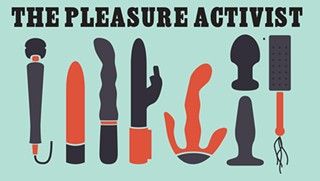Anal sex just may be one of the most divisive sexual activities. It draws in some of the most enthusiastic practitioners, sexual adventurers, and curious dabblers. At the same time it evokes some of the most scorn, fear, and outright condemnation. (These groups are not necessarily mutually exclusive. ) It wasn't until 2003 that the U.S. Supreme Court finally had to butt-in to declare that sodomy laws were unconstitutional. And even still, consensual anal sex is still prosecuted as an additional offense under "crimes against nature laws" in many states around the country. There is a web of variables that may play into the discomfort around the idea of anal sex, including homophobia, fragile concepts of masculinity, residual or overt religious stigma, general sexual stigma, cleanliness-related anxiety, unpleasant past experiences, and/or lack of imagination regarding the ability of that part of the body to serve multiple functions (i.e. excreting waste and receiving pleasure).
For those who were not able to make it out to this past workshop, you're in luck! While nothing replaces a dynamic discussion-based environment with fellow sex-positive individuals, I've compiled some of the important highlights from Jessy Schmidt's workshop.
I. Exploring On Your Own
It's a pretty good idea to explore your own body so that you can discover the different sensations and qualities of touch that evoke pleasure, pain, or discomfort in a safe, distraction-free space . Most of your sexual partners will inevitably introduce different sexual dynamics and interesting new sensations anyway, but it's helpful to at least have a foundational understanding of some of your preferences so that you can help your lover along when needed, and be able to recognize and communicate any discomfort you may feel much more quickly and effectively. In the context of anal stimulation, there are even more reasons to initially explore on your own. For most of our lives, we've primarily used our rectums and anal sphincters for one primary purpose—to poop. And with that, we have associated the sensation of any matter moving through our anus as synonymous as going to the bathroom. This can be disorienting for someone who is new to anal stimulation in a sexual context. So exploring on your own gives you an opportunity to create space for yourself to deliberately experiment and examine these sometimes conflicting sensations.
II. Lube is mandatory. Condoms and Gloves, too
Lube is one of the most important aspects of any sex that involves genital friction or penetration.
Whatever the case may be regarding natural vaginal lube production, there is not a single butt that produces any lube. None. So lube is definitely not optional, and will likely have to be regularly reapplied. Not only does it make anal penetration radically more comfortable and pleasant, but also significantly safer too. Lack of or not enough lube can create an environment of friction that can lead to micro-tears, chaffing, and open wounds. This is not only painful, but also leaves our delicate tissues vulnerable to exposure to various infections. Better too much lube, rather than too little. As Schmidt says, "By the time you feel like you need more lube, you've waited too long."
Many people use barriers such as condoms or gloves, not only for purposes of safer sex, but also as a way of providing a smoother, non-absorbent surface for their partners. Lube will last much longer if it is not also being reabsorbed through the skin of your partner's hands or penis. Latex or nitrile gloves are also a convenient method of smoothing out all the rough edges of your fingernails and calluses. The anus is a very densely packed area of nerve endings after all.
High quality water-based or silicone lube without any extra additives, flavors, sugars, or sensitizing/de-sensitizing agents work very well. There are many lubes out on the market that are specifically advertised as "anal sex" lubes. They are not all created equal. Many have chemical numbing agents that not only will prevent you from feeling important "red-flag" pains, but will ultimately dry you out and leave you even more vulnerable to tearing and discomfort. Some have natural numbing agents such as clove that work in subtler and less harmful ways. However, as Schmidt points out, anal sex (or any sex) is not about pushing through the pain. Pain is an indicator that your body wants whatever is happening to stop or at least change in some way. (Of course, the exception is if pain is your pleasure. But that is a different story with it's own set of safety features.)
Schmidt dispels the common misperception that anal sex is supposed to be uncomfortable (or even painful). But more on that next week.
Ally Booker is passionate about educating herself and others on sexuality. You can often find her milling around her shop, Jellywink Boutique, 418 E. 7th St. Contact the shop at 777-9434 or AllyBooker@Jellywink.com.




